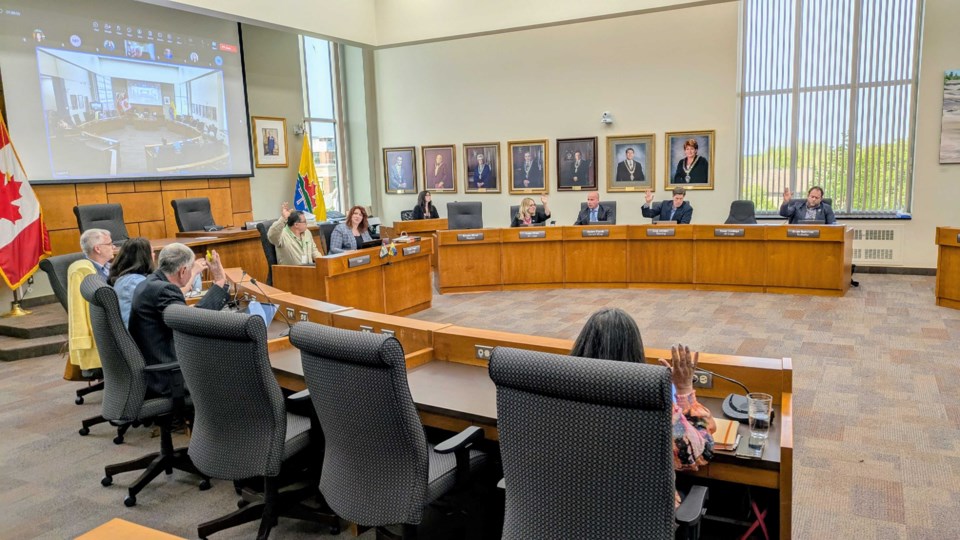THUNDER BAY — Council was locked in a stalemate Monday night by a proposal to lower the proportion of city taxes paid by commercial, large industrial, and multi-residential property owners.
Votes on the city's 2025 tax policy failed twice in a tie, causing council to defer the matter to its next meeting.
City staff’s recommendation to lower commercial, large industrial, and multi-residential tax ratios, effectively increasing the proportion of taxes paid by other property classes, was met with contention by half of city council.
Opponents of the recommendation said increasing the tax burden on full-service residential properties to incentivize new business wasn’t the right move.
Coun. Trevor Giertuga spearheaded a motion for council to instead adopt option three in the staff report, and leave the city's tax ratios at their current levels.
Thunder Bay has already shifted an “exponential amount from commercial, large industrial, and multi-residential tax ratio onto residential taxpayers,” Giertuga said.
Coun. Andrew Foulds sided with Giertuga, stating that “year after year,” the tax burden is shifted onto residents.
“The Walmarts of the world, they can afford to pay the City of Thunder Bay,” said Foulds. “I don't want to push them to the average.
"I'm okay for all residential owners to have below-average taxes because a lot of the workers that own businesses and work at commercial and they own homes. So, they're reaping the benefits of the lower taxes on the residential piece.”
Coun. Brian Hamilton disagreed. By adopting the status quo option, he said, the city would miss out on attracting new businesses, arguing that growth in the tax base could mean lower tax rates for everyone.
“I'm interested in the industrial and the commercial, and bringing those more in line with the provincial average," Hamilton said.
"Businesses do look at those; they're not just looking at the quality of life. They're actually looking at hard numbers and quantitative data when they're actually making these business decisions."
The city's director of revenue, Kathleen Cannon, advised against maintaining the status quo as it would not move the city’s business tax ratios closer to the provincial average.
“Option number one is recommended because it promotes economic growth in the long term," said Cannon.
"If we can attract businesses to Thunder Bay, it'll lower the tax burden on existing taxpayers. It enhances the city's long-term financial stability and provides greater equity among our property classes, and the residential property class continues to remain affordable.”
Under administration's preferred option, option one, tax ratios for multi-residential are reduced from 1.99 to 1.98, commercial is reduced from 1.98 to 1.97, and large industrial is reduced from 2.73 to 2.61.
The recommended would mean the tax rate increase on single-family residential properties would be 3.71 per cent — less than the 3.8 per cent tax levy increase cap set by council in the 2025 budget.
A home assessed at $100,000 would see a tax increase of $66.58. The median residential single-family detached home in the city, with an assessment value of $219,000, would see a $145.80 increase on its tax bill.
Giertuga's motion to choose option three, the status quo, lost in a six-six tie.
Couns. Foulds, Rajni Agarwal, Giertuga, Albert Aiello, Michael Zussino, and Kasey Etreni voted in favour and Couns. Greg Johnsen, Hamilton, Dominic Pasqualino, Kristen Oliver, Mark Bentz, and Mayor Ken Boshcoff voted against.
Coun. Shelby Ch'ng was not in attendance.
With the status quo option defeated, council moved to staff's recommendation, option one.
With council divided on the question, Aiello asked administration what would happen if that vote also resulted in a tie.
City manager John Collin advised council to call for a recess so that city staff can come up with an alternative option for council to consider. However, after a brief recess, Collin said city staff were unsuccessful in coming up with an alternative option.
Collin said, the only option was to have council vote and if option one was defeated, he would ask council to defer the report to June 23, when all members of council are expected to be in attendance for the vote on the designated truck route.
The vote on option one, to lower commercial, large industrial, and multi-residential tax ratios, also lost in a six-six tie, with all 12 council members maintaining their positions.
Foulds, Agarwal, Giertuga, Aiello, Zussino, and Etreni voted in against and Johnsen, Hamilton, Pasqualino, Oliver,Bentz , and Boshcoff voted in favour, and the question was deferred.
A second option included in the report from administration was not discussed in council. It proposed reductions to the commercial and industrial tax ratios, leaving the ratios for all other property classes at their current levels.
